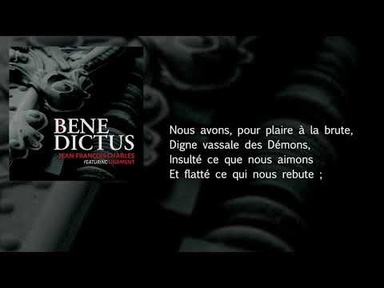Benedictus
Written in 2011 and recorded this year by Ligament—Anika Kildegaard (voice) and Will Yager (bass)—University of Iowa Assistant Professor Jean-François Charles’s “Benedictus” is a fitting song to listen to at a time when we are nearing the midnight of the year, to say nothing of midnight on the Doomsday Clock, which has been on the verge of twelve o’clock for so long that crisis seems to be a permanent state of affairs. Perpetual night seems like day, the forever war is the closest thing we have to peace, and constant gaslighting supplants truth. A fitting song, and a welcome song at a time when so much is coming into 20/20 focus that obliges us as individuals and as communities to examine our conscience.
I have a certain thing for dark nights of the soul, and of the mind. I have been reviving evening viewings of Twin Peaks with my beautiful wife and discussing how it is a dark soap opera, a sort of cinematic mashup of film noir and soap opera. Charles’s song is similarly a mashup, and it is similarly almost cinematic in its cutting between a setting of text from the Roman Sanctus and a spliced-together setting of Charles Baudelaire’s “L’examen de minuit” from Les fleurs du mal—or, as rendered in William Aggeler’s translation, “Examination of Conscience at Midnight” from Flowers of Evil.
“Benedictus” begins with a single-second sample of a clock, which is referenced in the first line of the poem...

An allusion perhaps to Pink Floyd’s “Time” (1973), which begins with a quiet ticking sound, and which is wrapped up in another sort of dark cinematic mashup (i.e., The Dark Side of Oz, about which I have written). Charles’s song further proceeds with a Pink-Floyd-like block of space music to clear the air and set the dark tone. The space is colored with an electric string bass, electroacoustic instruments being Charles’s specialty. The bass sounds intermittently through the song, as a kind of Greek chorus taking in the ironic display (irony is referenced in the second line of the poem). I will say a word about both display and irony. Both songs (“Benedictus” and “Time”) put wasted, defiled time on display in a way that can shock the listener awake (the ticking in “Time” is followed by an alarm clock going off). The same, incidentally, is true of Swoope’s “Schizo / Hollow Dreams Interlude,” from the album Wake Up (2012). For exposure, hopefully, is what can overcome vice, within and without. As the poet acknowledges at the end of Baudelaire’s poem, in the voice of a conspirator, “Quickly let us snuff out the lamp, / So we may hide in the darkness!” (Vite soufflons la lampe, afin / De nous cacher dans les ténèbres).
The irony consists in the juxtapositions of the mashup in Charles’s song. The text from the Sanctus is a blessing of he who comes in the name of the Lord (benedictus qui venit in nomine domini)—i.e., Jesus, as the second stanza of Baudelaire’s poem explains. The first sounding of the benedictus music concludes not with the expected note but with a note just adjacent, which segues into Baudelaire’s poet’s confession of sins—sins that prevent as it were a complete sounding of the benedictus music with a clear conscience.
There is more to confession than just words, though, for even the demons name the “Son of the Most High God.” Confession is repentance, turning toward compunction instead of cynicism. Appropriately, then, the poem is set schizophrenically with two voices, so to speak, the one harsh and the other mournful, even wailing. And confession is recurrent, because there is always another layer to expose in the soul. Appropriately, then, the two voices alternate. And it is the mournful, repentant voice that is able, as it were, to lead back to the benedictus music, through the word “light” (lumière). These two voices together with that of the benedictus music may be likened to the proverbial devil and angel on our shoulders as we pray to God in our heads in between, or they may be likened to the foolish thief and the wise thief, who give contrasting responses to Jesus crucified between them.
Through their juxtaposition, these two voices draw sharp almost visual lines between the bright light of repentance and the “wan light of putrefaction” (de la putrefaction… la blafarde lumière). The latter phrase is reminiscent of Emanuel Swedenborg’s discussion of people who think they are wise and good from themselves, rather than the opposite, being themselves from wisdom and goodness. He describes this mistake as that the people “close the higher regions of their mind…. Since the higher regions of their mind are closed, where the true light of life makes its home, a lower region of their mind opens up that is attuned only to the glimmer of the world. That glimmer, devoid of light from the higher regions, is faint and deceptive.” This attunement focuses purely on, as the poem says, “stupid and unfeeling Matter” (la stupide Matière).
The song brings out this material focus especially through its highlighting of two words: “baisé” and “l’ivresse.” “Baisé,” delicately translated by Aggeler as “kissed,” reveals its double entendre through its harsh, mechanistic repetition. “L’ivresse” (drunkenness) receives a similar treatment. The bass joins this mechanistic groove, now much more agitated, and this groove is then mashed up with the opening space music, leaving its meaning open.
